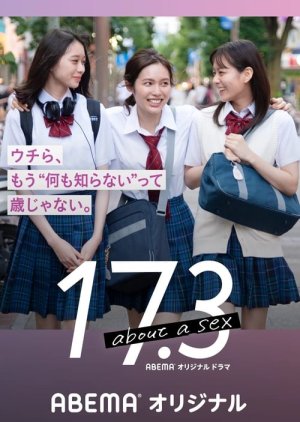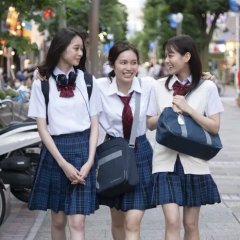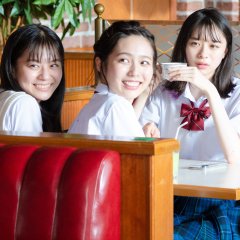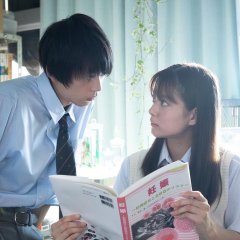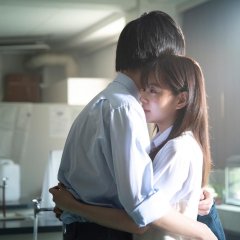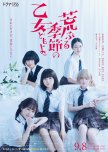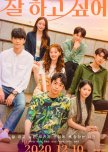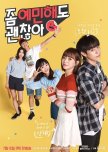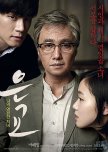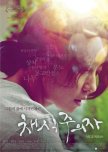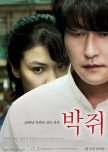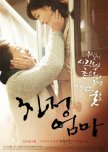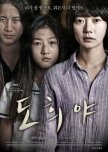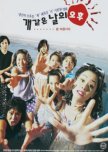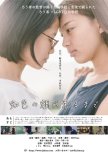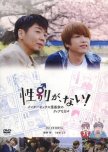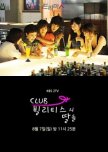Três meninas do ensino médio, de 17 anos e com diferentes níveis de experiência romântica, tentam descobrir quem elas realmente são e explorar sua sexualidade – sabendo que a idade média em que as meninas têm seu primeiro encontro sexual é aos 17,3 anos. Sakura é séria, mas ainda está curiosa em explorar seu lado sensual. Só que ela é frequentemente mal compreendida e seus esforços para descobrir mais sobre sexo às vezes saem pela culatra. Suas duas melhores amigas são polos opostos: Tsugumi não está interessada em namoro e se sente bastante indiferente sobre todas as coisas relacionadas ao romance. Yuna, por sua vez, já teve um relacionamento antes e atualmente está namorando um homem mais velho que trabalha em um escritório e que conheceu por meio de um aplicativo de namoro. (Fonte: Viki) Editar Tradução
- Português (Brasil)
- Русский
- Español
- Français
- Título original: 17.3 about a sex
- Também conhecido como: 17.3 About a Sex
- Diretor: Kanai Hiro
- Roteirista: Yamada Yuri
- Gêneros: Romance, Vida, Juventude
Onde assistir 17,3 Sobre o amor
Elenco e Créditos
- Nagase RikoSeino SakuraPapel Principal
- Tanabe RirikaHara TsumugiPapel Principal
- Akita ShioriMinagawa YunaPapel Principal
- Mizusawa RintaroAsahi YuPapel Secundário
- Niihara TaisukeHotta RyuseiPapel Secundário
- Fujieda YoshikiAoki KoutaPapel Secundário
Resenhas

Thoughts from an Asexual in her 20s
When most shows or movies advertise being about the teenage experience, you typically see a focus on things like first love, peer pressure, drugs, etc. And don't get me wrong, those things can definitely be a part of the teenage experience. But the topic that this drama decided to tackle is perhaps much more widely applicable. And needed. It's what sex education should be, told through the lives of realistic teenagers.In it, there are discussions not just about sex the deed, but many things related to it (in no particular order): stigmas and pressure, sexuality, desire, terminology, self-gratification, history, STDs, harassment, birth control, periods, pregnancy, abortion, parenthood, parent-child relations, consent, feeling ready/prepared, and even where to find additional resources. It doesn't feel crowded. Nor does it feel like a scare tactic to encourage abstinence (like what was used in my own sex education). It was organic. And realistic. And grounded in real experiences I or those around me have encountered.
It was told through the lives of 3 female leads who all had to learn something or another about the above topics: a sexually-experienced and outspoken female lead, a shy and nervous female lead raised in a conservative household, and the sexually-indifferent to sexually-repulsed aroace female lead who often acts as the voice of reason for the other 2. And at the end of each episode, they come together at their favorite diner to discuss the lessons they learned and to encourage each other once again to keep learning all they can and to accept one another on their different journeys.
At first I wondered why a diner? It's so public. But I guess that was the point. It's effectively saying that this is a normal part of life. One that doesn't need to be discussed behind closed doors. Because when you leave these conversations for only private spaces, you run the risk of not having the conversations at all.
And I say aroace (aromantic asexual), despite the FL in question only being canonically labelled asexual, because she defines herself as not interested in romantic or sexual relations. It was actually my only major gripe with this story. I actually had to stop and put this on hold because the way she handled this label was incredibly irksome and disappointing to me. And I needed to give it some breathing room in order to see beyond this at all the good qualities of her representation.
Here's why it disappointed. There is a big movement in the asexual and aromantic communities to raise awareness about the differences between sexual and romantic attraction. Too often, the conflation of those terms is used to delegitimize us and our experiences. Too often, the conflation of these terms confuse those of us just trying to figure ourselves out. Too often, the conflation of these terms leads us to believing that asexuality/aromanticism are terms that almost fit, but don't. And using a phrase like "there are many ways to be asexual" does not erase the potential harm of ignoring why that movement of awareness exists. And it's even worse when the resources and adult figure informing the FL all describe the term in terms of sexual attraction - but the FL turns around and almost solely uses the term in reference to romantic attraction (instead of perhaps saying both). "It means I do not feel any desire for a romantic relationship." Like I said, it irked. A lot.
Perhaps this could be partially the fault of the subtitles though, because I do think i heard the term aromantic pop up in the spoken dialogue a few times. But as I do not speak the language, I may never know.
That being said, I related to the asexual FL a lot. Her perspective on the conversations her friends had and the pressures she overheard were a lot like mine. Her annoyances and break downs stung, because I have (and even continue to) feel them. She's comfortable with the label, and won't hesitate to support her allosexual friends and advocate for the spectrum of experiences. She's good rep, conflation of the asexual and aromantic terms aside. So it is a great start for asexual rep, and I look at this character with all sorts of fondness for existing.
But one other warning i will give though, is that this is NOT a show to binge. While it does overall have a happy and hopeful tone with great messages, it tackles a lot of heavy, sensitive, and/or uncomfortable topics and experiences. And I don't think it's just my fellow aces who will be itching to hit the exit button after too many episodes in a row. So for the sake of your ability to enjoy and appreciate the story, I highly recommend only watching a couple episodes at a time.
A lesson for everyone
In many countries, the issue of sex is not taught probably and Japan is no exception. Many people believe that only heterosexual is normal yet they are actually wrong, the world is a lot more diversified than these people expect.In this drama, it covers 9 different issues related to sex including asexual, sex before marriage etc, which I believe everyone will be learnt a lot and be benefited after watching it.
It would be great if this is made compulsory for everyone to watch so fewer people will have those misconceptions about sex.

